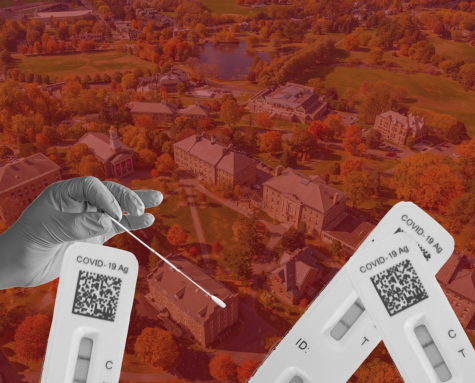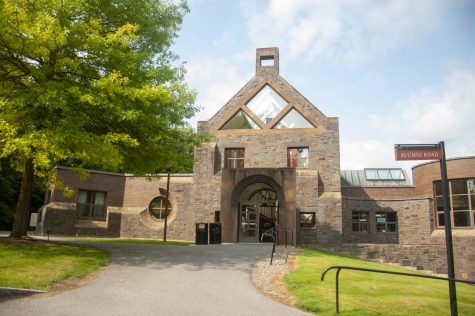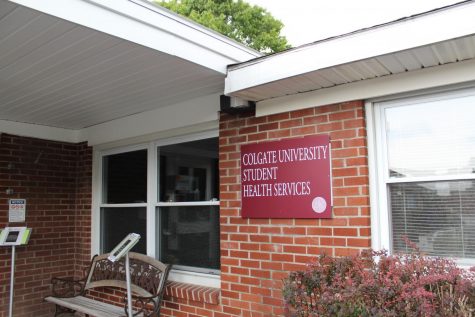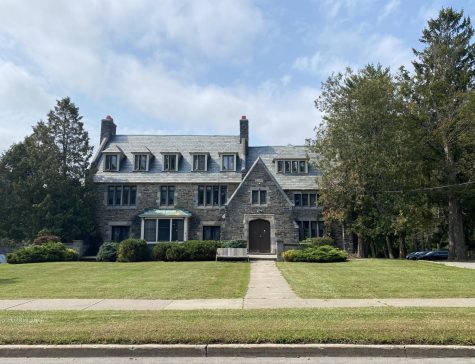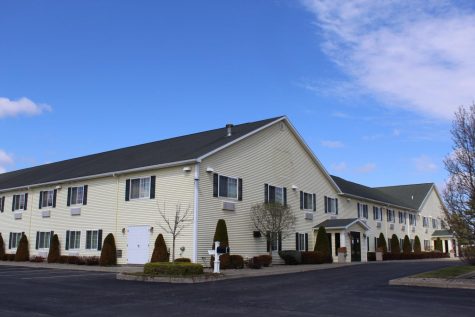Local and Colgate Communities Rally Around Hamilton Businesses Amidst Pandemic Losses
As coronavirus swept across the nation and New York Governor Andrew Cuomo announced his executive order “New York State on Pause,” small businesses everywhere suffered from closures. For the small businesses of Hamilton, the impact was three-fold: non-essential store fronts were shuttered, the customer base of Colgate students departed from campus and the highly profitable commencement and reunion weekends were canceled.
“This was really awful timing,” said Dan Foust, co-owner of FoJo Beans Coffee Roasters, a coffee shop in downtown Hamilton that celebrated its one year anniversary in February.
The federal government’s CARES Act, which includes the Economic Injury Disaster Loan (EIDL) and Paycheck Protection Program (PPP) through the Small Business Administration, have since run out of funding and did little to soften the blow, according to Partnership for Community Development Executive Director Jennifer Marotto Lutter.
“The rollout was chaotic,” Lutter said. “And the programs don’t necessarily work for a lot of our businesses.”
Lutter explained that between the EIDL and the PPP, only the PPP acts as a forgivable grant on the condition that the business owners are able to pay their workers, meaning the loan can only be deferred or forgiven if the business meets this requirement.
“In order for it to be forgivable, you need to rehire workers in June, and that’s not a given for a lot of businesses running the risk of taking on debt without promise of work,” Lutter said.
Lutter said that many Hamilton business owners have been denied the PPP due to high debt ratios. Farmers are not eligible to participate in the PPP, she explained, and questions of if or when agricultural aid will come weigh on the small-scale farmers who serve as an economic mainstay in rural Madison County.
In the absence of substantial federal aid, the Partnership for Community Development (PCD), a non-profit that works to promote the economy in Hamilton through support to businesses and farms, launched two separate grant programs for local businesses to support them in the transition to social distancing-friendly business models. The first, a 500 dollar digital marketing grant, helped cover website design packages and social media marketing for 11 Hamilton businesses. The same grant helped the Zen Den acquire a digital package for leading yoga classes virtually, according to Lutter. The second grant the PCD is offering is the Small Business Grant, funded entirely by donations to the PCD’s Small Business Fund which began collecting donations shortly after New York State closed non-essential businesses.
“It’s felt like Mach speed this whole time,” Lutter said.
Good Nature Farm Brewery founder and owner Carrie Blackmore, a Colgate graduate of the class of 2008, is one of the business owners making use of the PCD’s marketing grant.
“The PCD has been truly excellent,” Blackmore said.
Blackmore is also the first Hamilton business owner to face a permanent closure as a result of the pandemic. Good Nature’s Tap Room, located on Broad Street in downtown Hamilton, closed permanently just a few weeks into New York’s lockdown, as announced via Facebook on April 13.
“It was kind of a no-brainer,” Blackmore said, “We do not own that building, we are renters. We had to make that decision not knowing how long this can continue.”
Blackmore said her landlord for the Tap Room offered a 50 percent rent reduction for the month of April, but even that rent break was not enough to account for the lost profits and utility costs for the bar. Blackmore also said the final months of Colgate’s spring semester support Good Nature, especially during the slow winter months.
“A big, important time for our business is graduation, seating expands in the beer garden, we host a lot of different kinds of parties,” Blackmore said, “We scrape by to make it through January.”
Blackmore estimated losses on the scale of 35,000 dollars on canceled party bookings from March and April alone; cancelations for the graduation weekend lost them between 40-50,000 dollars in business. With curbside pick-up and online ordering platform, Blackmore said revenue still dropped by 75 percent following the lockdown measures. In a normal year, Blackmore and her employees focus on maximizing springtime profits, when the weather is nice and students make their way down to the Brewery more frequently, to save a nest egg for the winter. Instead, this spring Blackmore faced the difficult task of furloughing nearly her entire staff.
“It was one of the hardest days since we’ve been open,” Blackmore said of the day she called each staff member individually to inform them she no longer had work for them.
Blackmore was able to keep two of her staff members on, and said her office manager works from home now. She hopes to bring her brewers back by the end of the month.
Orders can be placed online or over the phone at (315) 824-2337.
Blackmore wasn’t alone among the Hamilton business owners forced to lay off employees. Dan Foust and Dan Joseph of FoJo Beans, who’s brick-and-mortar location just celebrated its first anniversary, layed off their entire staff just weeks after celebrating. Flour & Salt owners Brendan O’Connor ’09 and Britty Buonocore ’12, MA ’13 decided to quarantine for two weeks, closing their doors and temporarily laying off their staff.
“We really value our employees,” O’Connor said, “We did decide to lay them off for the two weeks we were closed, because of the federal unemployment benefits. We’re letting them decide if they’d like to stay on unemployment or come back to work. Most of them are coming back, and the staff who aren’t coming back are at risk in one way or another.”
After returning from their two-week quarantine, the couple prepped to make the bakery, which opened in 2016, safe for take-out orders, moving to curbside pick-up and reorganizing the furniture so that employees could remain socially distanced, according to O’Connor.
“We are really grateful we are deemed an essential business. We are doing it in the safest way we know how. Our staff isn’t coming into contact with our customers. Our staff is committing to quarantining outside of work,” O’Connor said.
The pair have also worked quickly to generate alternative sources of revenue and provide community services, launching the Donate a Dozen option. Donate a Dozen, shipments and pick-up and takeout orders can be made online or over the phone at 315-825-9311.
“I stole the idea from somebody on Instagram,” Buonocore said, laughing. “We’re generating revenue and delivering bagels to the hospital, Campus Safety, Colgate Buildings and Grounds, [Southern Madison County Volunteer Ambulance Corps] SOMAC and [Hamilton Fire Department] HFD.”
The Donate a Dozen option allows customers to buy bagels, cream cheese and butter to be delivered to essential workers, which the Flour & Salt staff deliver at intervals, according to O’Connor. The couple has also made bagel shipping available. Both options have seen a huge turnout of support from around the country, O’Connor said.
“People from all over the country are ordering bagels. Parents with kids multiple years out of Colgate, kids ordering,” O’Connor said. At the time of the interview, the couple reported that 120 dozen bagels had been ordered through Donate a Dozen, and they were going to be shipping 500 bagels. Buonocore said she expects that number to rise to 1,000.
While the pair said they didn’t have sufficient data to compare revenue from this year and last, they estimated losses at around 50 percent. O’Connor anticipates a difficult summer as well.
“We don’t really know how to anticipate this all that well,” he said, “We are gearing up to run our business this way for the rest of the summer.”
O’Connor and Buonocore are also in the camp of business owners working closely with the PCD and Lutter.
“We work with Jennifer at the PCD very closely, working with the other businesses in town to come up with a plan. Grubhub and Doordash don’t operate in a small town like this,” O’Connor said.
FoJo owners Foust and Joseph discussed the ways in which Hamilton business owners have come together to support one another through the crisis.
“This community has, I believe, shined through this,” Foust said.
Foust mentioned, in particular, that Buonocore helped set up FoJo’s online store, and that businesses are showing support by ordering lunch from one another.
Despite the community support, FoJo struggles. Foust and Joseph said they tried to implement a take-out service for food, but they weren’t getting enough orders to keep the kitchen open. They received both the EIDL and PPP funding they applied for through the CARES Act, and have applied for more grants through Hello Alice and the U.S. Chamber of Commerce. They also received the PCD marketing grant and have applied for the Small Business Grant.
“We are praying we get the grant money out there,” Joseph said, “The grants will save us.”
They remain concerned, however, about the debt that comes with the EIDL and potentially the PPP funding.
“That is a very large concern of ours. We watched a webinar explaining what’s forgivable,” Foust said, “We’re hoping to hold onto the money to pay employees when they come back.”
Foust and Joseph say they hope to bring their staff back by July, and they’re also hoping for more federal relief. In the meantime, the couple is doing what they can for the Hamilton community, transforming the dining area of FoJo into a sewing shop for PPE gear. Foust partnered with the Mask Mafia, a group based in Sherburne, NY, to coordinate the making and distribution of masks for local medical personnel and residents. They also began the Pay It Forward Fund, making drinks on their barista menu available to essential workers free of charge.
“We’ve been able to serve the Hamilton Police Department, Campus Safety, HFD, and SOMAC,” Foust said.
To donate to the Pay It Forward Fund, email [email protected] or call FoJo Beans at (607) 373-4026. FoJo’s signature coffee bean roasts are also available for purchase online, and can be shipped anywhere in the country.
The pair also said they’ve been lucky to receive a three-month rent break, as they rent through the Hamilton Initiative, an LLC operated by Colgate University. The Hamilton Initiative offered rent breaks to all 15 of its tenants, as reported by Bloomberg. That amounts to a loss of about 100,000 dollars for the University, according to the Bloomberg article.
While the Hamilton Initiative has offered rent breaks for business owners, not all have been so lucky. Hamilton Whole Foods (HWF), a deli and bulk grocer on Broad Street coming up on its 30th anniversary, did not receive such a break according to manager Heather Dockstader ’04. Dockstader also noted the dramatic difference in HWF’s business model as a result of the crisis, shifting away from its deli services and focusing on supplying groceries for the community.
“We’re letting in one customer at a time, wearing facemasks. We changed the layout to make social distancing easier,” Dockstader said. “We’re managing, but business is way down. Restaurant business is down, say, 95 percent, catering down 100 percent, but groceries are up 10 percent.”
HWF is adapting for social distancing measures as well, making curbside pick-up and delivery available, creating an online inventory and taking orders through email, according to Dockstader.
“We’re low-tech, and we do a lot of work with bulk,” Dockstader said.
The online inventory can be found here and orders can be sent to [email protected] or placed over the phone at (315) 824-2930.
Dockstader also shared that with the departure of HWF’s student workers, they have been able to keep the rest of their staff on the payroll, including three full-time employees and one part-time employee.
“We’ve shortened our hours, to give a little break and stay healthy,” Dockstader said. “Just maintaining, taking care of ourselves, being supportive, generous, understanding.”
Dockstader noted that a pleasant surprise through it all was an email from Mark Sibold ’18, saying he’d created a search bar for their online inventory. She also said Colgate students have been hugely supportive since the campus closed.
“Colgate students have been buying gift cards, gift baskets and t-shirts,” Dockstader said. “We’re fortunate, right?”
Dockstader explained the silver lining of the crisis has been the customers.
“They’re already typically nice, and forgiving, and accommodating. The best attributes of our customers are coming out more,” Dockstader said. “But it’s also a little sad because we’re not having those daily interactions, we’re losing the loving atmosphere of the store because the store isn’t a gathering place.”
Dockstader also noted the strong sense of support in the community she’s felt for the village’s businesses. PCD’s Lutter shared her sentiment.
“I have hope for Hamilton because I think there’s such a strong sense of solidarity. Maxwells completely sold out of stock for Easter. I hear these kinds of success stories and I think ‘it’s gonna be okay’,” Lutter said.
Lutter also mentioned Gwenn Werner, the owner of local general store Parry’s, for her fast and community-minded response to the pandemic.
“She’s such a leader,” Lutter said, “She immediately set up a Shopify and launched a free delivery service, acting as a food hub for local produce.”
Blackmore also mentioned the strength of the local community, reflecting on a time when Hamilton was less lively.
“Honestly, I’m very grateful. I remember Hamilton in the ’90s, I remember a lot of empty storefronts. We’ve come so far, I’d hate to see any of us shutter,” Blackmore said.
Foust and Joseph reflected on how the community has come together over the last several weeks.
“It’s brought the village together, making it tighter than it ever was before,” Foust said. “The students, staff, faculty––I have to believe that they see the importance of all of us surviving. This isn’t about Dan Joseph and myself, it’s about our community.”
O’Connor encouraged students to reach out to the businesses they hope to see when they return in the fall.
“I would encourage the Colgate community at large to reach out to the businesses that they value and figure out the best way they can help,” O’Connor said.
Lutter seemed to sum up best what businesses were seeing across the board.
“Hamilton is really special, and the response we’ve received from local and Colgate communities makes that clear,” she said.
As New York begins to ease out of its lockdown, the businesses of Hamilton remain hopeful about bringing back employees in the summer and eagerly await the return of students in the fall. In the meantime, donations to the PCD Small Business Fund are still being accepted here.



